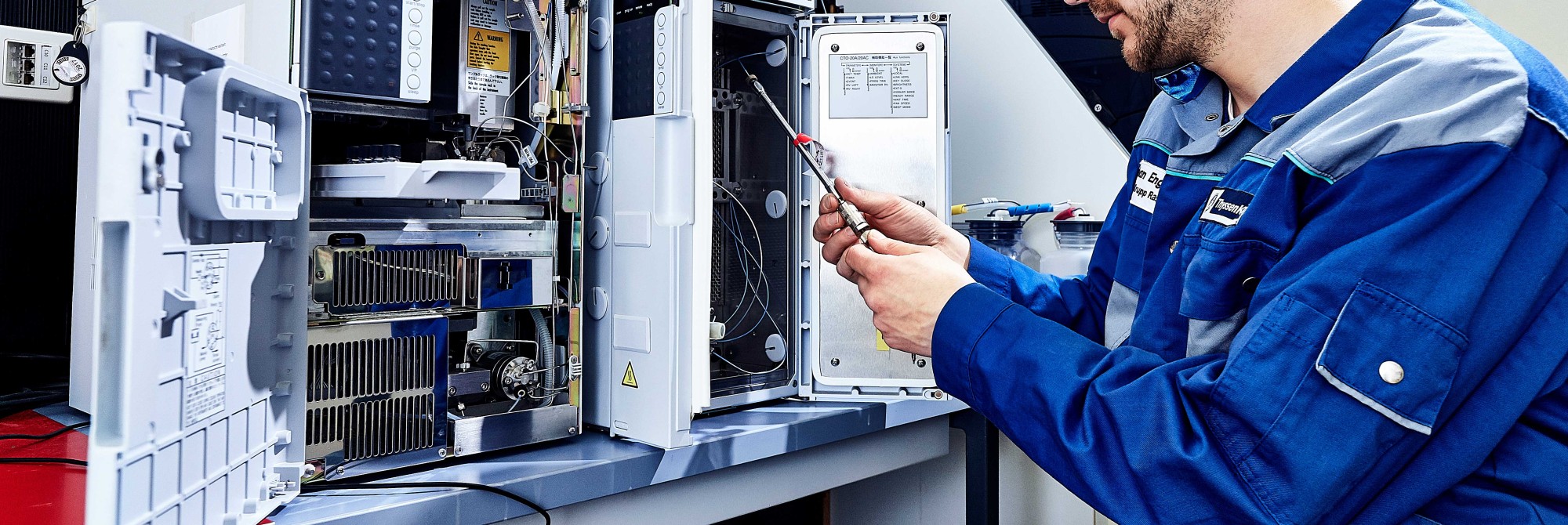Development and research
Smart and innovative solutions that meet your requirements better than ever
In Andernach, thyssenkrupp conducts research and development spanning the entire manufacturing process of packaging steel. The company works continuously to improve production processes and products and to optimize existing materials and develop new ones. For these purposes, it makes use of sophisticated technical equipment that satisfies the rising demands of Industry 4.0 and regulatory requirements, particularly in regard to food.
Development activities concentrate on smart solutions that meet customer needs regarding efficiency, lightweighting and lean processes even better than before. By pooling innovation competencies in specialized teams and building cross-company technology networks with partners along the value chain, we are able to maximize improvement potentials.
Materials science and metallurgy
New and optimized steel grades for packaging
The Materials Technology department at thyssenkrupp Rasselstein in Andernach and the Innovation department at thyssenkrupp Steel in Duisburg work hand-in-hand when it comes to developing new steel grades for use in packaging. For example, synergy effects are created and exploited for virtual material and product optimization. Innovations and experience from other industrial sectors are thus also being applied in the further development of packaging steel.
The Finite Element Analysis (FEA), for instance, is a good example of the interdisciplinary exchange of expertise. This efficient process has already been used in the automotive industry for years, and is constantly being developed further. It uses complex material models to simulate how materials perform in terms of forming and stability. Interdisciplinary cooperation now allows the effects of changes in packaging geometries to be simulated in a targeted manner, and thickness reductions can be implemented efficiently.
In this way, materials technology continuously contributes to optimizing production processes and products, as well as developing entirely new packaging steel grades. The result is intelligent solutions that even better meet customer requirements in terms of quality, sustainability, efficiency and lean processes.
Surface technology and chemistry
The perfect surface finishes for your applications
The Surface technology teams – organic and inorganic – focus on optimizing the finish of packaging steel materials. Their activities concentrate mainly on developing suitable new metal/metal oxide surfaces together with matching organic coatings (lacquers, polymer films). The teams collaborate closely with each other and with technical customer support as well as their colleagues in production and sales to develop appropriate solutions for each target group.
Broad spectrum of surface analyses
Our analytical resources range from scanning microscopy to layer depth analysis using glow discharge spectroscopy, through to electrochemical impedance spectroscopy. Scanning microscopy yields topographic surface images and is also useful in the analysis of chemical surface compositions. Electrochemical impedance spectroscopy provides insights into the interaction between a metal surface and an organic coating (lacquer and/or plastic film) applied to it. The benefit of such electrochemical methods lies in the fact that they supplement traditional tests in allowing us to identify application and coating defects which cannot be detected by DC measurements.
Corrosion and adhesion tests
Using various electrochemical techniques, thyssenkrupp Rasselstein experts can determine the aggressiveness of, e.g., a canned product toward the tinplate surface. These tests permit valuable corrosion resistance forecasts. Traditional corrosion tests using automatic moist heat cycling to DIN standards are likewise conducted. With composite products (film/lacquered tinplate), the focus is on adhesion testing, particularly to describe adhesion properties after forming and sterilization processes.
Close contacts to thyssenkrupp and academic research departments
To supplement its own analytical capabilities, our surface technology team maintains close ties to thyssenkrupp research departments, external research organizations and academic institutes to maximize synergy effects.
Applications
Analysis and optimization of your processes and products
The main tasks of the Application technology team include analyzing and optimizing your products and processes and verifying the forming capability of the packaging steel grades. Advanced equipment is available for simulating the processes used to manufacture steel packages at the customer. This helps to identify potentials, such as possible ways of increasing efficiency or reducing thicknesses.
Technical equipment
We draw on extensive technical resources to analyze and improve our customer’s products and processes. Our strength, pressure and temperature measurement instruments help to optimally analyze the processes. Testing instruments can be adjusted and adapted in an integrated workshop area.
Measuring and testing facilities
Stability characteristics such as axis stability, base stability or peak formation pressure, can be determined by appropriate measuring systems. The shape accuracy of the products can be tested by means of highly exact contour and thickness measuring instruments. The determination of surface parameters such as roughness, topography (also values in 3D) or gloss/brightness helps us improve our product quality.
Supporting our customers
Our expert engineers and technicians conduct joint projects with customers and partners from the tinplate industry to optimize the processing characteristics of tinplate. This also includes the cooperation with leading machinery manufacturers, universities and various associations.
A team of specialists can be dispatched to conduct production analyses at a customer's site. The team makes available advanced mobile equipment such as measuring instruments for determining product quality, form analysis systems, and a high speed camera.
Additionally, new tinplate applications are developed in close cooperation with the Innovation Center.




